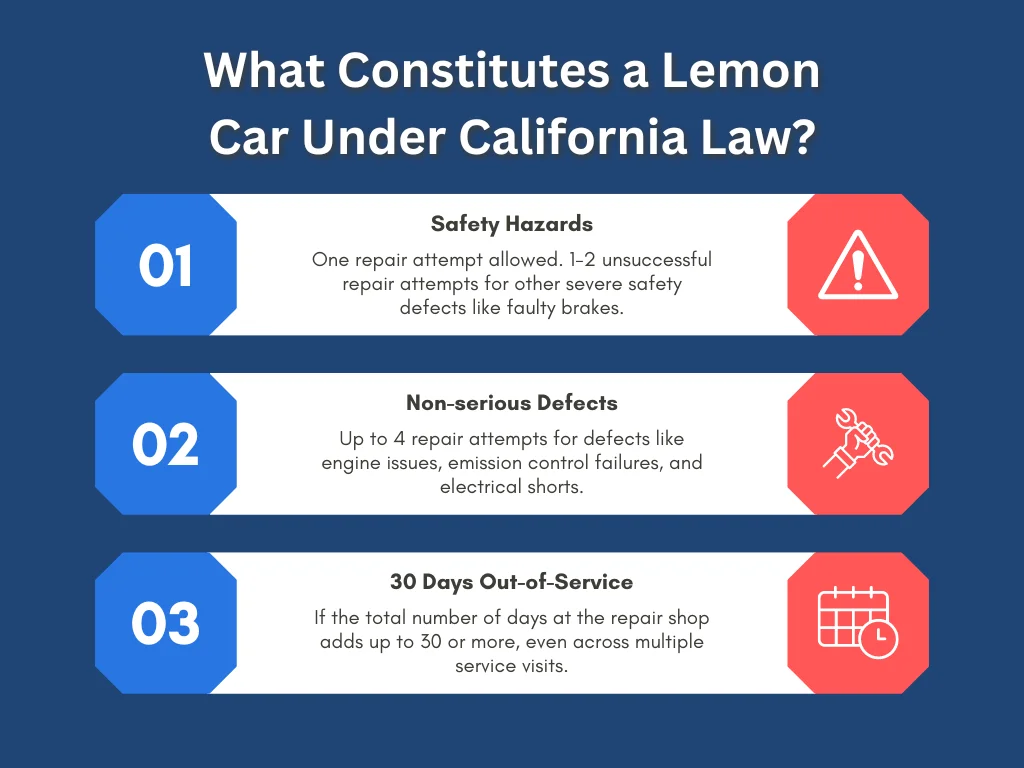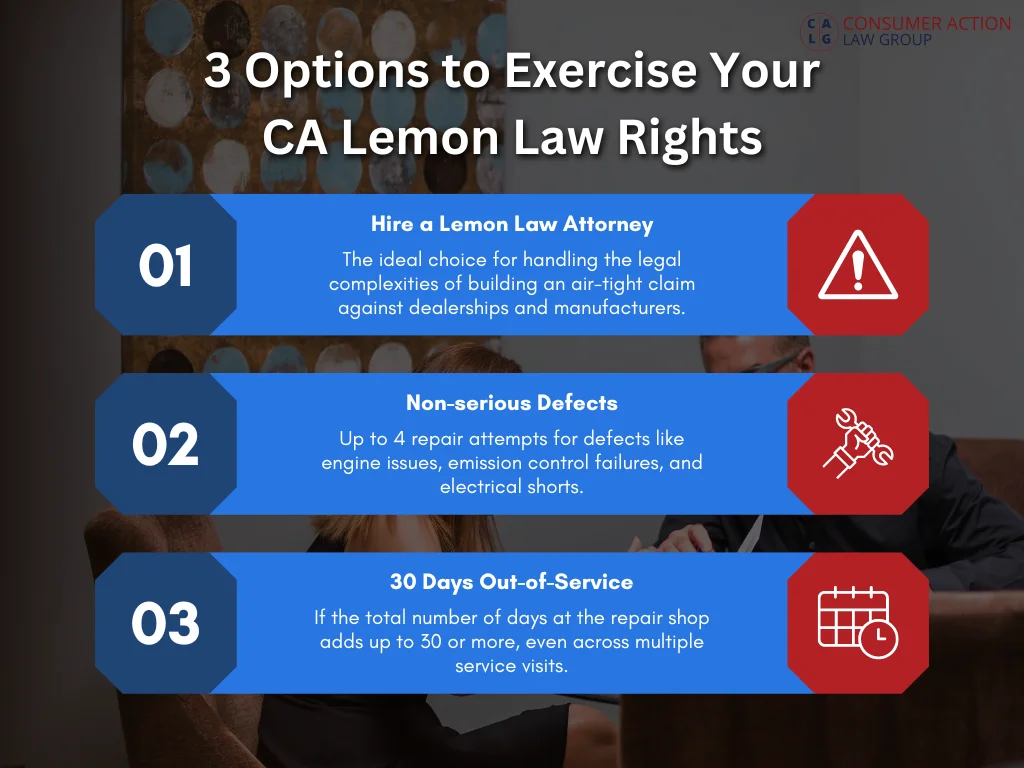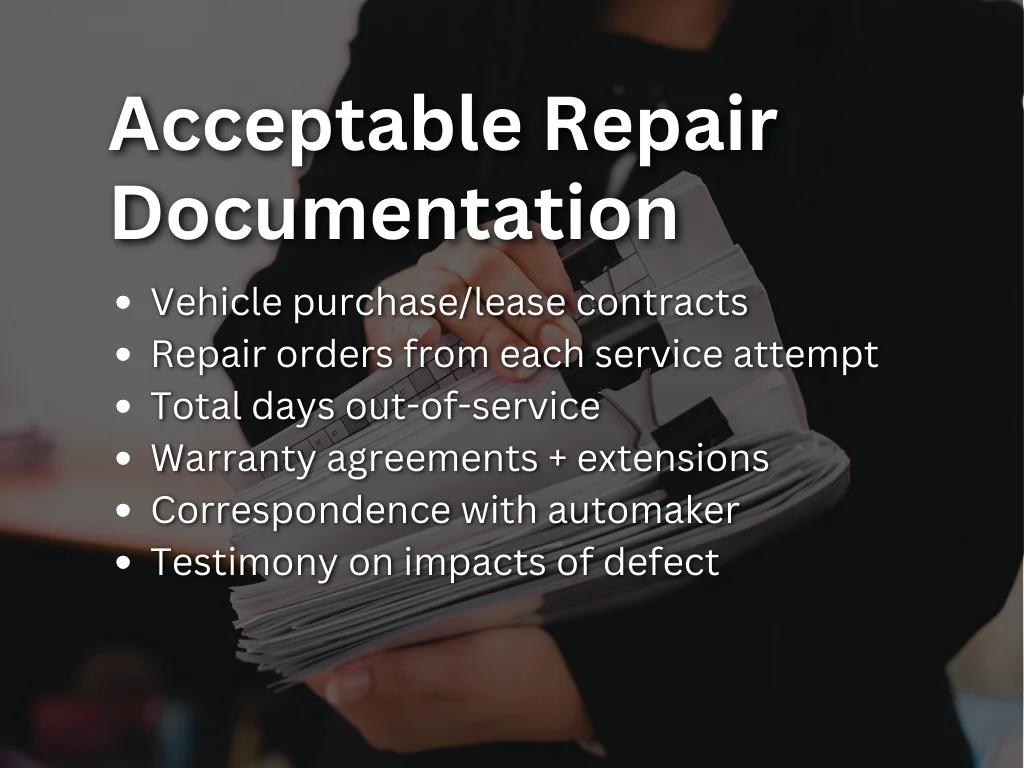Reviewed by Attorney: Charles Panzarella
Buying a defective vehicle can leave you with more than buyer’s remorse. But if you purchased or leased a problematic car in California, state lemon laws offer essential protections, including the option to replace or repurchase vehicles that qualify.
This guide examines how California’s Song-Beverly Consumer Warranty Act works to help consumers understand their rights and recourse when saddled with a “lemon” purchase.
What Constitutes a Lemon Car Under California Law?
California’s lemon law covers new passenger vehicles like cars, SUVs, and light trucks that fail to pass state operational and safety standards. Both purchases and leases are protected when vehicles are still under the original factory warranty.
For a car to qualify as a “lemon” eligible for replacement or refund under CA law, it must meet one of these defect criteria:
- Safety Hazards – One repair attempt allowed: For severe safety defects like faulty brakes, impaired visibility from windshield cracks, or airbag non-deployment – just 1-2 unsuccessful repair attempts by the automaker before qualifying under the state’s lemon law.
- All Other Issues – Up to 4 repair attempts: Non-safety performance and mechanical defects like engine troubles, electrical shorts, or emission control failures qualify if 3-4 repairs have been unable to fix the issue.
- 30 Days Out-of-Service – If the total number of days at the repair shop hits 30 or more, even across multiple service visits, that meets the state’s timeframe standards for a lemon clunker.

Pro Tip: The less time a defective vehicle is driven before requesting buyback under lemon laws, the higher its resale value. This generally leads to greater refund value.
When Providing Notification is Critical
To qualify for legal protections, buyers must notify the automaker by certified mail about the defect before their warranty expires – whichever hits first:
- 18 months from the original delivery
- Odometer hits 18,000 miles
- The factory warranty period ends
This formal written notice outlines the defect, documents repair attempts, and shows the buyer actively engaging the manufacturer to fix purchase issues in reasonable timeframes.
Response urgency & paper trails demonstrating outreach efforts preserve lemon law qualification rights going forward even if additional problems later occur.
Can You Return a New Car After Purchase in California?
You can return a car you just bought if you purchased a contract cancellation option agreement. This agreement allows you to return your vehicle within a specific timeframe and if you meet any other requirements listed in the contract. You can also return a new car if it turns out to be a lemon. A lemon car is a car that has a serious warranty defect that the dealer can’t fix, even after several attempts.
How Do I File a Lemon Car in California?
You can file a lemon car in California if your vehicle has warranty defects that the dealership cannot fix. The initial step for most people is to send a demand letter to the dealership. The letter should:
- Identify the car in question, such as the year, make, model, and VIN,
- Describe who you are in relation to the vehicle,
- List the reason why you are writing the demand letter, and
- What you wish the dealership to do for the lemon car (usually a replacement vehicle or a refund).
Mail the letter via certified so you have proof that you sent the demand letter to the dealership and that they received it. Once the dealership gets the letter, they have 30 days to respond to it. The dealership can either work with you to get you the remedies that you listed in the letter, deny your demand, or simply ignore it.
If the dealership denies or ignores your demand, but you believe that your car is a lemon, you will need to file a lawsuit to legally make the dealership compensate you for selling you a lemon car. This process can get extremely time-consuming and complex, so it is worth discussing your case with a lemon lawyer to learn about your options.
3 Options to Exercise Your CA Lemon Law Rights
If you determine your defective California vehicle indeed meets state-defined conditions for a refund or replacement, next steps include:
- Hire a Lemon Law Attorney – Ideal for handling the legal complexities of building an air-tight claim against automakers. Specialized representation navigates litigation hurdles consumers struggle with going solo using faster out-of-court settlements.
- Pursue Vehicle Manufacturer Arbitration – Every automaker offers an arbitration program to resolve complaints without court. However, the process tends to favor manufacturer interests over buyers. It is still faster/cheaper than litigation in some no-attorney instances.
- File Small Claims Action – Consumers can hear their lemon law case in small claims court with low filing fees for disputes under $10K. While cheaper with no lawyer fees, producing the documentation and evidence needed alone is still challenging.

Critical Records Required in Lemon Law Claims
Precise documentation required varies based on factors like automaker, authorized dealer agreements, and legal counsel involvement. But here are some key items to demonstrate in pursuing compensation:
- Vehicle purchase/lease contracts
- Repair orders from each service attempt
- Total days out-of-service
- Warranty agreements + extensions
- Correspondence with automaker
- Testimony on impacts of defect
Additionally, consumers should comprehensively track:
- Symptoms of defect
- Interactions with dealer + manufacturer
- Loaner car, rental costs, etc.

While state lemon laws provide essential options for recourse in California, motorists saddled with a defective vehicle face an uphill battle from automaker arbitration programs favoring manufacturer interests to obstacles navigating complex litigation independently.
In many cases, specialized legal representation offers the highest probability for satisfactory outcomes – whether through accelerated out-of-court settlements or skillfully navigating courtroom litigation.
The Bottom Line: Don’t Get Stuck with a Lemon
If you’ve purchased what appears to be a lemon vehicle in CA, relief options exist, whether hiring attorney support or self-advocating claim options against the automaker.
But knowing specific protocols on notification timing, repair attempt documentation, and understanding qualification criteria remains key to demonstrating your rights under California lemon law provisions as soon as problems arise.
Acting urgently alongside methodically tracking every vehicle issue and repair interaction will best position consumers seeking just reimbursement or replacement for that problematic lemon purchase.
